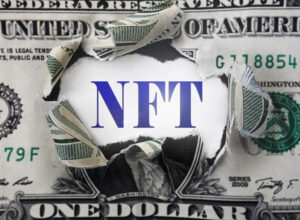 Back in June of last year, I had the pleasure of interviewing on these pages a leading IP lawyer in the then smoking-hot NFT space. If the heat and hype around NFTs then, just a few short months ago, was at jalapeno level, then we are currently in ghost pepper territory, with nary a day going by without some media mention of NFT sales. With those sales often for what can seem to the uninitiated as ungodly sums of money. And with the money flowing in, the lawsuits are following right behind, including cases filed by disgruntled NFT purchasers alongside criminal actions against NFT scammers. From the Bored Ape Yacht Club, to VeeCon, to the introduction of the term “rug pulls” into the criminal law lexicon, the action is incessant. Given the attention level around NFTs, it is not surprising to see leading VCs pumping significant money into NFT-centered startups.
Back in June of last year, I had the pleasure of interviewing on these pages a leading IP lawyer in the then smoking-hot NFT space. If the heat and hype around NFTs then, just a few short months ago, was at jalapeno level, then we are currently in ghost pepper territory, with nary a day going by without some media mention of NFT sales. With those sales often for what can seem to the uninitiated as ungodly sums of money. And with the money flowing in, the lawsuits are following right behind, including cases filed by disgruntled NFT purchasers alongside criminal actions against NFT scammers. From the Bored Ape Yacht Club, to VeeCon, to the introduction of the term “rug pulls” into the criminal law lexicon, the action is incessant. Given the attention level around NFTs, it is not surprising to see leading VCs pumping significant money into NFT-centered startups.
As usual, not every media story about NFTs does a good job of explaining what the legal rights of owners and investors are around NFTs, with most stories preferring to highlight sexier elements like celebrity involvement or massive transaction amounts or general discussion about how NFT ownership is a must for each and every red-blooded American. I exaggerate on the last one, but there is no doubt that, as with other crazes, fear of missing out is a potent inducement for many to invest in NFTs, even if their level of understanding of what they are actually getting for their investment is lacking.
With all the juice around the NFT space, there remains a significant gap in public understanding about them, including why they are commanding so much attention, with a moneyed or aspirational segment of the public at least. Put another way, there is a need for mainstream folks to develop some NFT literacy in a broader sense — and we as IP lawyers have a significant role to play in the effort. At a minimum, we have an ethical obligation to ensure that the grifters are exposed and the vulnerable are protected, an obligation that extends to making sure that our clients and friends are protected from some of the criminal, or at least unsightly, behavior exhibited by scammers looking to exploit the uninformed “investors” that want to participate in the NFT craze.
Lest you think I am exaggerating the need for greater NFT literacy, please consider the following excerpt from an NYU Law preliminary research paper by leading IP scholars Stefan Bechtold and Christopher Sprigman: “Any discussion of NFTs must immediately confront an unscalable wall of misinformation and hype.” Misinformation and hype are not words that are normally associated with legitimate business areas, which is undoubtedly what leading NFT purveyors are looking to become. At the same time, the authors astutely observe that the current state of play in the NFT space involves wading through a lot of misinformation and hype, often at the expense of the main-street rube looking to make a quick buck by investing in NFTs. Those risks aside, as the authors note, the genius of NFTs is how they have created “a way of making digital works scarce, which is possible because the NFT allows you to identify the owner of the ‘authentic’ copy.” In short, when you buy an NFT, what you are buying is the right to call yourself an owner. The challenge, however, is in understanding what you actually own.
As the authors explain:
The “nonfungible” in “nonfungible token” refers not to the artwork but to the block of code that makes up the NFT. NFTs are often shorthanded as “linking” to an artwork, or “pointing to” or “representing” it. But those characterizations are misleading. NFTs identify a particular digital artwork only in the most general way: They contain a “hash” of the artwork as part of the code that makes up the NFT, and some contain a link to an internet address that displays a copy of the artwork. The artwork itself (i.e., digital code from which the artwork can be rendered by a computer) is not part of the code of the NFT.
Put another way, congratulations to NFT buyers, you are now the proud owners of some digital code. Pot jokes aside, owning a hash just doesn’t sound as cool as owning an NFT. But let’s be clear, just because someone buys an NFT, that almost always also means that they don’t own the underlying copyrighted work that their hash points to on the internet. So it’s a different form of ownership than what we usually think of when someone buys a Picasso for cheap at a garage sale.
While, for now at least, the idea of owning an NFT is perhaps most associated with works of digital art, a more interesting current association with NFTs circles around the idea of NFTs as an entry ticket for a social club of sorts. Take the Bored Apes for example. In the past, if you wanted to associate with celebrities, you could buy the products they endorse, or visit the same South Beach nightclubs they frequent. Now, assuming you own a lot of crypto and can figure out the labyrinthine buying process, you can also join the club of Bored Apes NFT owners. Or if you prefer simple drawings of various cartoon animals, you can buy a VeeFriend NFT, the purchase of which inducts you quite deeply into the GaryVee universe — with admission to VeeCon included. Or the Flyfish Club, which grants NFT holders access to an upcoming restaurant. I realize that for at least some of this readership this all sounds like gibberish. But just like people are willing to pay many thousands of dollars to say they went to the Super Bowl in person or for their golf club membership, so is there demand for NFT “projects” that promise owners they will be included in some kind of exclusive community.
In light of the money involved, it is no surprise that the space has a bit of a Wild West-feel, attracting the usual assortment of scammers and prospectors. At the same time, there has been no hesitation on the part of those who have fallen prey to scams to initiate litigation to recover what they claim was stolen. And recent announcements by various prosecutorial offices of crackdowns on crypto-related scams have included public disclosure of NFT-scammer arrests. As with most things, particularly in fast-growing commercial areas, a cautious approach on behalf of buyers to make sure they are only interacting with reputable NFT sources is advisable.
Ultimately, we are right to assume that NFTs are here to stay. While most of the attention will continue to fall on high-profile transactions for what may seem like obscene amounts of money, the appeal of NFTs to a general impulse favoring collectibles almost promises that additional mass-market NFT projects will eventually take root. Likewise, we can expect that more interesting use cases for NFTs will continue to develop, building on the existing concepts of NFTs as proxies for conference tickets, trading cards, or admission to posh social clubs. Until then, it is worth learning as much as we can about NFTs from a legal perspective, so that we are better consumers of media discussion of the phenomenon. As well as better counselors for our clients, especially those interested in dropping five grand on a Derek Jeter Platinum Signed. NFTs may not yet be for everyone, but the time for IP lawyers to know what they are all about is now.
Please feel free to send comments or questions to me at gkroub@kskiplaw.com or via Twitter: @gkroub. Any topic suggestions or thoughts are most welcome.
Gaston Kroub lives in Brooklyn and is a founding partner of Kroub, Silbersher & Kolmykov PLLC, an intellectual property litigation boutique, and Markman Advisors LLC, a leading consultancy on patent issues for the investment community. Gaston’s practice focuses on intellectual property litigation and related counseling, with a strong focus on patent matters. You can reach him at gkroub@kskiplaw.com or follow him on Twitter: @gkroub.








